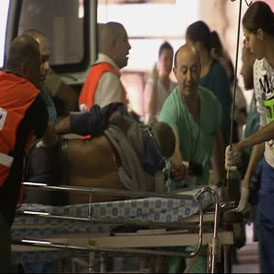Bomb in Jerusalem coupled with Palestinian air strikes
Multiple injuries reported after a bomb exploded at a bus station in Jerusalem whilst Palestinian militia group launch rockets against other Israeli targets.

Dozens of ambulances converged on a Jerusalem bus station after a bomb exploded, injuring a number of people.
Initially the blast was believed to have been a suicide bus mission but it was later revealed that the bomb was planted close to the main conference hall the bus station. One emergency worker revealed:
“The main amount of casualties were in a bus station next to the bus, perhaps the explosion was in the station next to the bus entrance because there does not seem that there was an explosion inside the bus, the bus is whole. What we have treated, three critically injured, two unconscious and four moderately injured.”
It has since been confirmed that one person died and at least 30 have been injured.
Internal Security Minister Yitzhak Aharonovitch told Israel’s Channel 2 television: “(We believe) the device weighed about 1-2 kilos… .It exploded in a small suitcase on the sidewalk next to the bus stop.”
The device weighed about 1-2 kilos… .It exploded in a small suitcase on the sidewalk next to the bus stop. Security Minister Yitzhak Aharonovitch
Prime Minister Benjamin Netanyahu postponed his visit to Russia in the wake of the explosion, the first in Israael’s capital for over six years. It is not yet known who planted the explosion but it will raise questions about the security within the walled city.
It follows strikes on the Gaza strip on Tuesday by Israeli forces that resulted in the death of four civilians, including three children playing football, and five militants.
Islamic Jihad, a Gaza based group allied to Hamas, admitted responsibility for earlier reprisal attacks on the Israeli towns of Beersheba and Ashdod, wounding one.
The “exchange of blows” drew Mr Netanyahu to make this firm statement of intent in Parliament, before the explosion in Jerusalem: “No country would be prepared to absorb protracted missile fire on its cities and civilians, and of course the State of Israel is not prepared to.”
Later he followed with this official statement: “It could be that this matter will entail exchanges of blows, and it may take a certain period of time, but we are very determined to strike at the terrorist elements and deny them the means of attacking our citizens.”
U.S. President Barack Obama condemned the bomb attack: “There is never any possible justification for terrorism. The United States calls on the groups responsible to end these attacks at once and we underscore that Israel, like all nations, has a right to self-defense.”
He also sent condolences to the families of the dead Palestinians following attacks in Gaza on Tuesday, and urged that both sides halt the violence and an end to civilian casualties.
Barak Seener, a Middle East expert at RUSI, said the bombing 'demonstrates that Israeli's defence capacity is eroding':
He said the increasing use of long range missiles against Israel means it will have to rethink its security strategy: "For years the wall managed to prevent attacks, but over the weekend we saw a family killed in the West Bank. Today we have seen a bomb in Jerusalem.
"Israel is going to have to form alternative defences, but it risks having a military engagement in Gaza before it has a chance to form a long term deterrent."
Mr Seener said the threat against Israel has heightened since the collapse of Hosni Mubarak's regime in Egypt and Iran's efforts to exploit the fissures happening throughout the Middle East.
"The threats to the north and south mean a shift in Israel's doctrine."